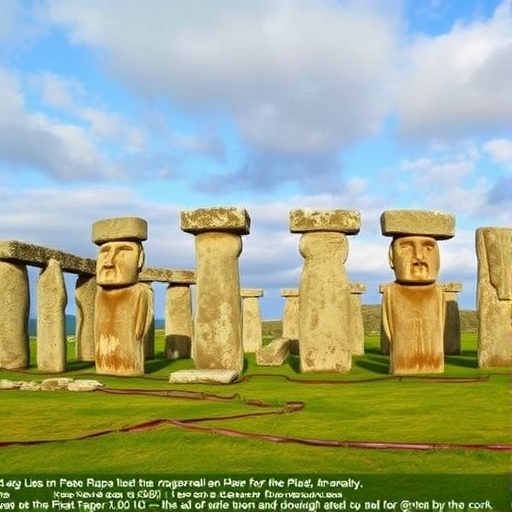A recent study has unveiled the impact of prolonged drought on Rapa Nui, famously known as Easter Island, during a critical phase of its history marked by the decline of megalithic monument construction. This research, published in the journal Commun Earth Environ, sheds light on how climate change and environmental stressors influenced one of the most enigmatic societies of the Pacific. The findings provoke thought about the interrelationship between environmental sustainability and societal development, particularly in the context of ancient civilizations.
The team of researchers, led by Stein, also included prominent scholars such as Curtin and Balascio, who have dedicated their careers to understanding environmental changes and archaeological records. Their comprehensive analysis relies on multi-proxy environmental data, revealing how climatic variations, particularly droughts, profoundly affected the cultural practices of Rapa Nui’s ancient inhabitants. As the islanders faced increasingly difficult living conditions, the once-thriving culture of monumental stone carving began to wane, representing a shift in priorities for the community.
Ancient records and archaeological findings have long suggested that the construction of massive stone statues, known as moai, was central to the societal structure of Rapa Nui. These monumental constructions, often transported across the island, required significant resources and labor. However, as the research highlights, extended periods of drought likely disrupted agricultural production, a core element that sustained the population and facilitated these labor-intensive endeavors.
The study utilized a variety of methods, including sediment core analysis and paleoclimate reconstructions, to piece together the climatic history of Rapa Nui. Through this meticulous approach, researchers detected significant shifts in rainfall patterns, coinciding with the timeline of reduced moai construction. This correlation prompts serious questions about the resilience of ancient societies to climate variability and their adaptive strategies in the face of ecological challenges.
As the scientists delved deeper into the implications of their findings, they discovered that the protracted drought may have triggered social upheaval, resource competition, and even a reorganization of cultural practices. The narratives surrounding the moai’s significance, once seen as symbols of power and prestige, may have transformed drastically, as the peoples of Rapa Nui shifted their focus from monumental expressions to more immediate survival strategies.
Interestingly, this research aligns with a growing body of literature examining the environmental histories of isolated islands. In these contexts, scholars have increasingly noted how limited resources exacerbate the effects of climate change, exerting pressure on pre-existing societal structures. The case of Rapa Nui illustrates the delicate balance between cultural expression and environmental sustainability, offering a powerful lesson for contemporary societies grappling with similar challenges.
The findings also open avenues for dialogue regarding modern implications of ancient lessons. As humanity faces an escalating climate crisis, the experiences of the Rapa Nui serve as a cautionary tale about the potential consequences of environmental neglect. Today, understanding how indigenous populations adapted to changing climates may inform current and future approaches to sustainability, conservation, and resilience.
While the specifics of Rapa Nui’s monumental decline remain complex, this research significantly contributes to the understanding of how environmental factors can dictate social trajectories. It emphasizes the importance of integrating environmental science with historical analysis, particularly in studying how societies evolve or devolve in response to ecological changes. The detailed account of Rapa Nui’s environmental history reveals valuable insights that resonate beyond the island, urging a reevaluation of our relationship with nature.
The researchers conclude that the narrative of Rapa Nui is not solely a story of decline but also one of adaptation, resilience, and transformation in the face of adversity. Just as the islanders navigated their challenges, so too must contemporary societies learn to adapt to the realities of a changing climate. As they move forward, regaining the balance between cultural heritage and environmental stewardship remains crucial for ensuring the sustainability of modern civilizations.
Collectively, the research not only adds depth to the academic understanding of Rapa Nui’s history but also galvanizes public interest in ancient societies and their strategies for coping with environmental crises. With climate-induced stressors becoming an ever-increasing reality, the tale of Rapa Nui serves both as a historical caution and a contemporary call to action, reminding us that the choices we make today will shape the future for generations to come.
In summary, the study’s implications resonate sharply with the ongoing debates regarding climate change adaptation and resource management in present-day societies. It invites all of us to reflect on the lessons that history offers, emphasizing the interconnectedness of environmental health and cultural prosperity. As we continue to witness the dramatic effects of climate change around the world, learning from ancient experiences like those of Rapa Nui may prove vital for fostering more resilient societies.
By integrating rigorous scientific methods with historical inquiry, this research not only enriches our understanding of Rapa Nui but also underscores the need for collaborative efforts in addressing environmental challenges. As climate and ecological pressures mount globally, studying the past may provide the essential groundwork we need to build a sustainable future. Indeed, the experience of Rapa Nui stands as a testimony to the enduring resilience of humanity, regardless of the challenges posed by nature.
Through the prism of Rapa Nui’s history, we are reminded of the fundamental importance of stewardship and responsibility towards our environments. The lessons learned here are not just for scholars or historians but for anyone invested in the future of our planet. The message is clear—just as the ancient islanders faced their trials with resourcefulness and innovation, so too must we rise to the occasion, embracing creativity and adaptability in the face of climate change.
Subject of Research: Prolonged drought on Rapa Nui and its impacts on cultural practices and monument construction.
Article Title: Prolonged drought on Rapa Nui during the decline of megalithic monument construction.
Article References:
Stein, R., Curtin, L., Balascio, N.L. et al. Prolonged drought on Rapa Nui during the decline of megalithic monument construction.
Commun Earth Environ 6, 865 (2025). https://doi.org/10.1038/s43247-025-02801-4
Image Credits: AI Generated
DOI: https://doi.org/10.1038/s43247-025-02801-4
Keywords: Climate change, Rapa Nui, drought, megalithic monument, societal decline, environmental history.




